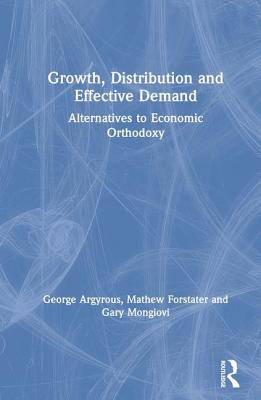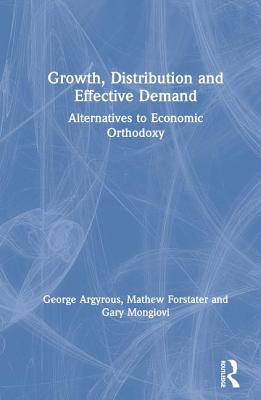
Door een staking bij bpost kan je online bestelling op dit moment iets langer onderweg zijn dan voorzien. Dringend iets nodig? Onze winkels ontvangen jou met open armen!
- Afhalen na 1 uur in een winkel met voorraad
- Gratis thuislevering in België vanaf € 30
- Ruim aanbod met 7 miljoen producten
Door een staking bij bpost kan je online bestelling op dit moment iets langer onderweg zijn dan voorzien. Dringend iets nodig? Onze winkels ontvangen jou met open armen!
- Afhalen na 1 uur in een winkel met voorraad
- Gratis thuislevering in België vanaf € 30
- Ruim aanbod met 7 miljoen producten
Zoeken
Growth, Distribution and Effective Demand
Alternatives to Economic Orthodoxy
George Argyrous, Gary Mongiovi
Hardcover | Engels
€ 182,45
+ 364 punten
Omschrijving
Growth, Distribution, and Effective Demand presents original essays on a variety of topics in theoretical and applied economics. The book honors the work of Edward J. Nell and develops interconnected themes that run through the modern Post-Keynesian tradition. The first part deals with the fundamental idea that economic growth is demand-driven, with special attention to policy ramifications. The second theme concerns the connection between economic growth and the structural characteristics of a market economy. These issues are closely linked to a critical tradition that calls into question key elements in orthodox economics. The final part of the book aims to buttress non-orthodox approaches to growth and distribution by critiquing particular aspects of the conventional theory, by elaborating neglected themes in non-orthodox theory, or by exploring some overlooked methodological ideas.
Specificaties
Betrokkenen
- Auteur(s):
- Uitgeverij:
Inhoud
- Aantal bladzijden:
- 374
- Taal:
- Engels
Eigenschappen
- Productcode (EAN):
- 9780765610096
- Verschijningsdatum:
- 30/09/2003
- Uitvoering:
- Hardcover
- Formaat:
- Genaaid
- Afmetingen:
- 150 mm x 239 mm
- Gewicht:
- 657 g

Alleen bij Standaard Boekhandel
+ 364 punten op je klantenkaart van Standaard Boekhandel
Beoordelingen
We publiceren alleen reviews die voldoen aan de voorwaarden voor reviews. Bekijk onze voorwaarden voor reviews.











